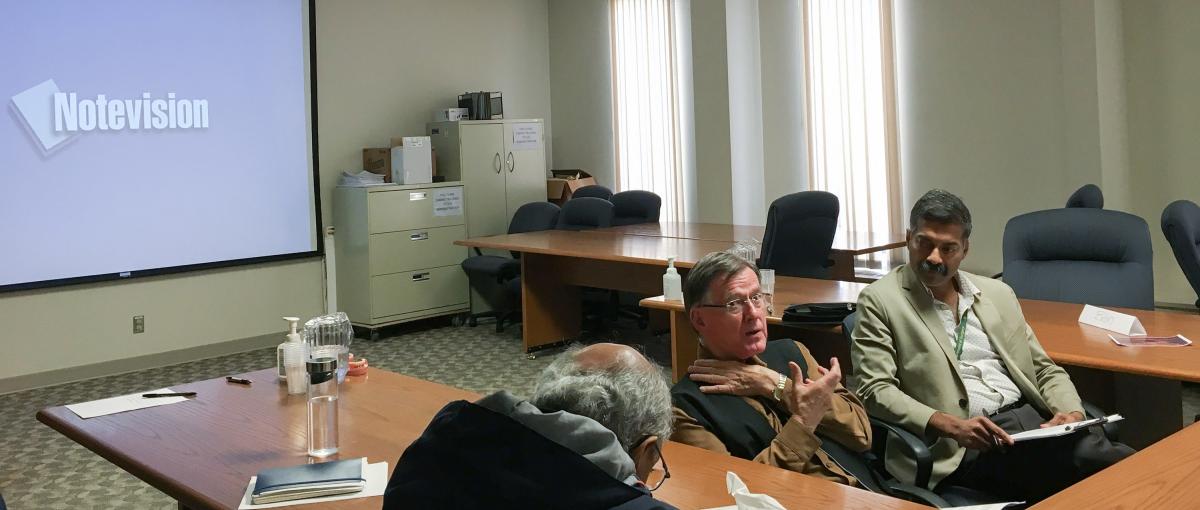Cancer survivor inspires peers
iRSM patient supports those awaiting reconstructive surgery

January 21, 2019
By Katrina Lingrell, Senior Advisor, Digital Communications, Covenant Health
After throat cancer left him unable to speak or eat solid food, Bernie Krewski never imagined that he’d serve as an inspiration. But thanks to the oral prostheses and rehabilitation he received at the Institute for Reconstructive Sciences in Medicine (iRSM), Bernie now gives hope and support to patients awaiting reconstructive procedures.
“I try to function with both feet on the ground, but at the same time convey that I have been able to cope and help other people if I can,” Bernie says.
Reconstructive surgery is often one of the last steps in helping cancer survivors feel whole or normal again, but it doesn’t always happen right away. Patients can wait months or years for their reconstructive surgeries due to the high volume of services iRSM offers, and during this time they may feel socially isolated.
Preparing for surgery is often challenging, says Marlen Rosela, Nurse Navigator at iRSM, which is based in the Misericordia Community Hospital. “Most of them are scared of the unknown.”
iRSM is globally renowned for its specialized head and neck reconstructive services. It rebuilds faces and restores function and dignity in patients after cancer, trauma or congenital conditions.
Bernie, 79, shares his experiences at orientations for new iRSM patients to quell some of the uncertainty others may have. Answering questions at the information sessions, Bernie’s talk includes demonstrating how his state-of-the-art dental prostheses work.
“I think it gives them hope,” says Jacqueline Hills, Clinical Care Manager at iRSM. “It allows them to ask some of those questions of people who have lived it.”
Bernie was diagnosed with throat cancer in 2005 following three biopsies, exploratory surgery and 32 radiation treatments. He dropped 50 pounds, was unable to speak and lost his teeth due to the side-effects of his radiation treatments.
While he was free of cancer, Bernie was still healing. He needed to learn to communicate through a speech valve, ingest pureed foods and chew ice to stay hydrated. Without teeth, Bernie’s cheeks were sunken in. Pronouncing words through his speech valve was difficult. He still considers himself lucky, though.
“I was fortunate because while I ended up without a natural voice, my health was generally good otherwise,” Bernie says. “I didn’t have to endure a lot of pain like other people have, even though people who see me think I might be in pain—I’m really not.”
The next milestone was receiving oral rehabilitation from the iRSM team. The oral prostheses fixed his sunken-in cheeks, improved his speech and allowed him to eat solid foods as long as he had liquid to help him swallow.
Michael Jukosky, like Bernie, lost his teeth after treatment for his throat and neck cancer. He’s been cancer-free since April 2017, but it hasn’t been an easy journey.
“I was a hard-working person, but (now) I barely have enough energy to walk around the house,” Michael says. He’s adapted his speech and is only able to ingest liquids. Undergoing reconstruction and rehabilitation at iRSM will mark the final stage in his healing, but waiting is difficult.
“The hardest part is losing normal speech and the ability to eat solids,” Michael says. “I feel uncomfortable around other people because I have trouble speaking.”
Hearing Bernie’s story is reassuring. “There is a light at the end of the tunnel,” he says. The oral rehabilitation and prostheses at iRSM will make it easier for Michael to communicate and help him ingest solid foods without the fear of choking.
Providing that comfort is why Bernie speaks to others.
“When you help someone, you give them a little bit of hope,” Bernie says. “Feeling like I’m helping someone keeps me motivated.”
And though he will never look exactly the same as he did before his cancer diagnosis, Bernie feels good.
“I’m not worried about looking perfect—and if you ask my wife, I never look perfect in terms of my dress—but my concave cheeks were bothersome and it affected my speech as well,” Bernie says.